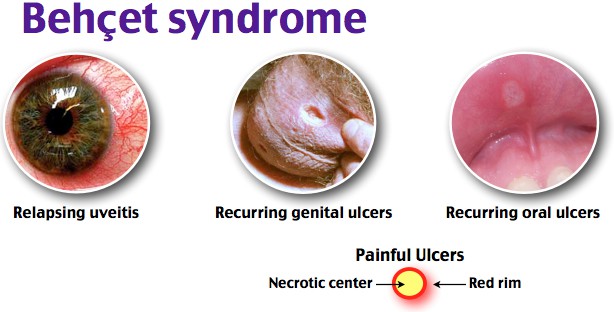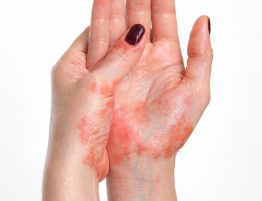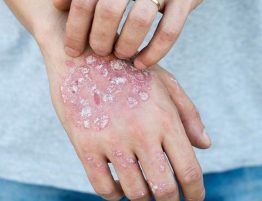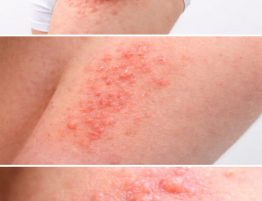
Behcet’s disease, also called Behcet’s syndrome, is a rare disorder that causes blood vessel inflammation throughout the body. The disease can lead to numerous signs and symptoms that can seem unrelated at first. They can include mouth sores, eye inflammation, skin rashes and lesions, and genital sores.
Behcet’s disease is a chronic condition. The severity of the disease varies from person to person.
Symptoms
The earliest symptoms of Behcet’s disease are sores inside the mouth. They look like canker sores. The sores usually heal within a few weeks. Somewhat less common than mouth sores are genital sores. They appear in about 3 out of 4 people with Behcet’s disease. Sores can appear elsewhere on the body especially the face and neck.
Behcet’s disease may also affect the eyes. Patients may experience the following;
- Swelling in one or both eyes
- Vision problems
- Eye redness
- Sensitivity to light
Other symptoms include;
- Joint pain and swelling
- Digestive problems, including abdominal pain and diarrhea
- Inflammation in the brain, leading to headaches
Causes
The cause of Behcet’s disease is unknown, although most experts believe it’s an autoinflammatory condition.
An autoinflammatory condition is where the immune system — the body’s natural defense against infection and illness — mistakenly attacks healthy tissue.
In cases of Behcet’s disease, it’s thought the immune system mistakenly attacks the blood vessels. It’s not clear what triggers this problem with the immune system, but 2 things are thought to play a role;
- Genes – Behcet’s disease tends to be much more common in certain ethnic groups where the genes that are linked to the condition may be more common.
- Environmental factors – although a specific environmental factor has not been identified, rates of Behcet’s disease are lower in people from an at-risk etchnic group who live outside their native country.
Diagnosis
No tests can determine whether a person has Behcet’s disease, so the doctor will rely primarily on signs and symptoms. Because nearly everyone with the condition develops mouth sores, mouth sores that have recurred at least three times in 12 months are generally necessary for a diagnosis of Behcet’s disease.
In addition, a diagnosis of Behcet’s disease requires at least two additional signs, such as;
- Recurring genital sores
- Eye inflammation
- Skin sores
Tests a patient may need include;
- Blood tests or other laboratory tests might rule out other conditions.
- Pathergy test – in which the doctor inserts a sterile needle into the skin and examines the area one to two days later. If the test is positive, a small red bump forms under the skin where the needle was inserted. This indicates the immune system is overreacting to a minor injury.
Treatments
There’s no cure for Behcet’s disease, but it’s often possible to control the symptoms with medicines that reduce inflammation in the affected parts of the body.
These medicines include;
- Steroids – powerful anti-inflammatory medicines
- Immunosuppressants – medicines that reduce the activity of the immune system
- Biological therapies – medicines that target the biological processes involved in the process of inflammation
The patient’s healthcare team will create a specific treatment plan for them depending on their symptoms.
What We Offer
We at Almurshidi Medical Tourism will find the best doctors to cater to your needs. We are partnered with a wide network of hospitals and clinics that provide top quality medical experience.
We provide free medical estimates, make medical appointments, and provide several medical opinions if needed at no cost.
Contact Us
For more information contact us at +66822004040 or via WhatsApp








